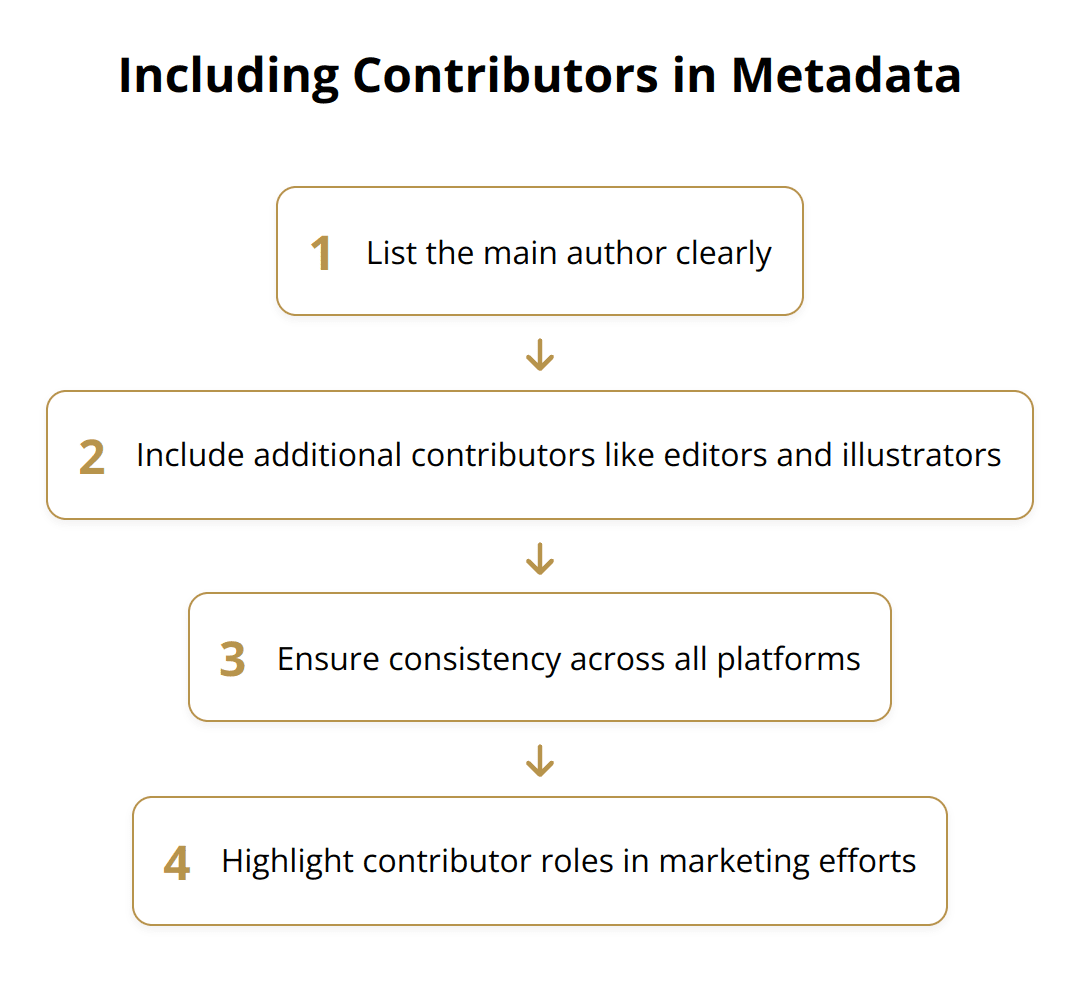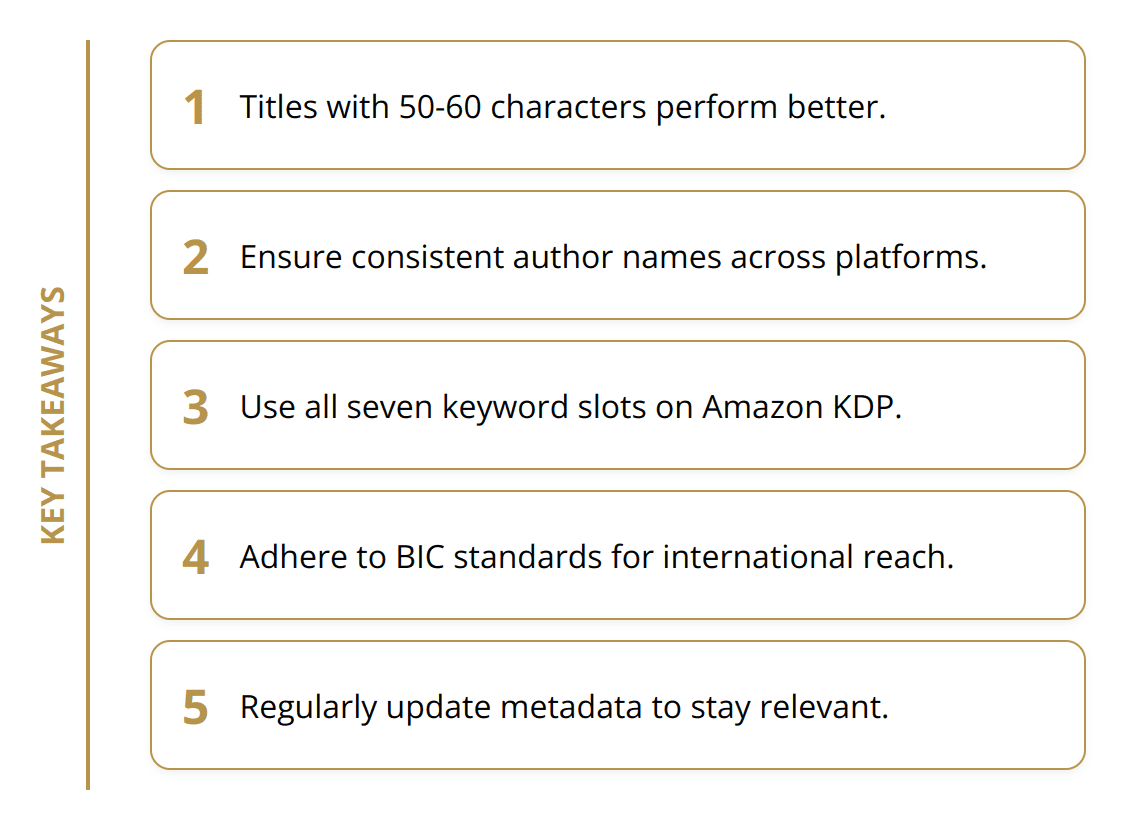Metadata is vital for your book’s visibility and discoverability.
It affects how search engines and online bookstores categorize and present your work.
At Beverly Hills Publishing, we focus on providing you with the best tools and tips for optimizing your book metadata.
In this blog post, we will share concrete strategies and useful resources to help you optimize your book metadata effectively.
What Are the Key Components of Book Metadata?
Optimizing book metadata is more than just keyword stuffing; it involves attention to detail across several key elements:
Title and Subtitle
The title and subtitle are the first points of interaction between your book and potential readers. A well-crafted title should be both captivating and clear. Current data shows that titles with 50-60 characters perform better in search engine results.

Consider the genre and target audience when selecting a subtitle. Non-fiction books often benefit from descriptive subtitles that elaborate on the book’s content. A strong subtitle can also include relevant keywords, significantly boosting discoverability.
Author and Contributors
Correctly listing the author and contributors is not just about giving credit; it’s a crucial component of metadata. Ensure the author name is consistent across all platforms. Inconsistent author data can mislead algorithms and confuse potential readers.

Featuring additional contributors like editors, illustrators, and foreword writers can add authority to your book. This is particularly important for academic and non-fiction works.
ISBN and Publisher Information
The International Standard Book Number (ISBN) serves as a unique identifier for your book. While obtaining an ISBN is an investment, it’s an essential part of professional publishing. Books with ISBNs are more likely to be accepted by libraries and bookstores.
Make sure to correctly attribute publisher information. Self-published authors often overlook this, but it’s vital for building credibility. If you’re using a different name for publishing, verify that it appears uniformly across all platforms.
Things to keep in mind:
-
Titles with 50-60 characters perform better.
-
Consistent author names are vital for SEO.
-
ISBNs improve your book’s acceptance rate in libraries and bookstores.
For specific strategies on how to enhance your book metadata, SEO for authors offers comprehensive advice.
Effective metadata optimization isn’t just a one-time task. Continuously refining these elements can significantly impact your book’s success.
How to Optimize for Search Engines
Search engines are indispensable for your book’s discoverability. Optimizing your metadata for search engines can significantly increase your book’s visibility and sales.
Keywords and Phrases
Using relevant keywords and phrases is crucial for search engine optimization (SEO). Rather than stuffing keywords, focus on incorporating relevant terms naturally throughout your metadata. Tools like Google Keyword Planner or Ahrefs can help identify high-traffic keywords that align with your book’s content.
Select keywords that reflect your book’s genre, themes, and main topics. Aim for a balance between high-traffic keywords and less competitive long-tail keywords. For example, instead of just “thriller,” use “psychological thriller with a female lead.”
Descriptive and Compelling Blurbs
Crafting a captivating blurb is essential. A well-written blurb does more than just describe the book; it attracts readers and improves search engine rankings. Use actionable language and highlight what makes your book unique.
Here’s what to focus on:
-
Lead with a hook: Grab the reader’s attention within the first sentence.
-
Highlight key elements: Mention the protagonist, main conflict, or unique setting.
-
Incorporate keywords naturally: Ensure the blurb contains some of your targeted keywords, but don’t overdo it.
-
Keep it concise: Aim for around 150-200 words.
Choosing the Right Categories and Tags
Accurately selecting genres and categories is crucial. Misleading categories can irritate readers and hurt your rankings. Platforms like Amazon allow multiple categories, so take advantage of this feature to maximize your book’s exposure.
Here’s how to choose effectively:
-
Browse similar books: Look at the categories of top-selling books in your genre.
-
Utilize BISAC codes: These help precisely categorize your book, which platforms use to improve discoverability.
-
Incorporate sub-categories: These can increase visibility to niche audiences. For example, within “Romance,” you could also list “Paranormal Romance.”
Tips for Effective Metadata Optimization
-
Update periodically: Regularly review and update your metadata to align with changing trends.
-
Test and analyze: Use A/B testing to determine which keywords and descriptions perform best.
-
Leverage clickable tags: Include clickable tags that direct readers to collections of related books.

- Monitor analytics: Platforms like Amazon KDP offer insights into how your book is performing, enabling you to tweak metadata for better results.
By focusing on these pivotal areas, you can enhance your book’s discoverability significantly. For more strategies, check out our guide on SEO for authors.
Tools for Metadata Optimization
Amazon Kindle Direct Publishing Tools
One of the most essential tools for metadata optimization is Amazon Kindle Direct Publishing (KDP). Amazon commands a significant portion of the eBook market, so focusing on optimizing metadata for this platform is critical. KDP’s backend offers valuable insights and tools to refine your metadata. Take advantage of their keyword entry fields, which allow up to seven keyword phrases.

Targeting both high-traffic and niche terms will enhance your book’s discoverability. Moreover, KDP offers precise category selection, allowing you to choose up to two main categories and additional subcategories for better targeting.
Google Books Partner Center
Google Books Partner Center provides another robust platform for optimizing your book’s metadata. This tool allows authors to reach millions of potential readers across Google’s vast network. Google’s search engine prowess means that well-optimized metadata can significantly boost visibility. Their interface is user-friendly, making it easy to enter and update key metadata elements, including book descriptions, subject categories, and keywords. Google Books also employs an advanced algorithm that factors in your metadata for more precise search results.
Book Industry Communication Standards
Book Industry Communication (BIC) metadata standards cannot be overlooked. While these might sound technical, adhering to them ensures that your book metadata is aligned with industry practices, which directly impacts how booksellers and libraries categorize and discover your work. Utilizing BIC standards involves correctly using descriptive elements like BISAC codes, which categorize books by genre. For those unfamiliar, BISAC codes are essential for retailers and libraries in indexing and shelving books accurately.
For authors looking to go international, BIC standards also incorporate Thema subject codes, optimizing your metadata for global discoverability. Thema codes act as universal identifiers, bridging language and regional differences, and ensuring that your book can be easily classified across various international platforms.
Practical Tips:
-
Use all seven keyword slots on Amazon KDP.
-
Regularly update your metadata in Google Books Partner Center.
-
Adhere to BIC standards for broader international reach.
Employing these tools and services, you’ll position your book for maximum visibility in both domestic and international markets. For further strategies on metadata, explore our publishing industry analytics.
Conclusion
Effective metadata optimization is essential for your book’s visibility and discoverability. By focusing on key components like titles, author details, and ISBNs, you set a strong foundation for better search engine rankings and reader engagement.

Summarizing the techniques discussed, well-crafted titles and consistent author names markedly improve SEO. Utilizing ISBNs and proper publisher information builds credibility. Emphasizing relevant keywords in book descriptions and selecting accurate categories and tags boosts searchability.
Making use of tools like Amazon KDP’s keyword fields and Google Books Partner Center’s metadata options can significantly enhance your book’s market presence. Adhering to BIC standards ensures broader global discoverability through accurate genre categorization.
We at Beverly Hills Publishing are committed to helping authors achieve success by offering advanced strategies in publishing and branding. Discover more about our innovative approach and how we can help you at Beverly Hills Publishing.
For further insights into the importance of effective metadata, refer to our comprehensive SEO guide for authors. Remember, regularly refining your metadata can substantially impact your book’s success and longevity in the marketplace.
By implementing these techniques, you can maximize your book’s potential, ensuring it reaches the widest possible audience.















































































































































































































































